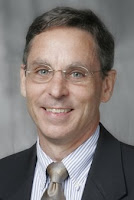"If we pervert this, we will all lose."
Over the last week or so opponents of healthcare reform have been latching on to end of life provisions in the House bill, claiming it would promote euthanasia among our nation’s seniors.
In the July 3 edition of The Bioethics Channel, Myra Christopher and Dr. Christian Sinclair of Kansas City Hospice both expressed concern that the debate would turn in that direction.
“This is not about trying to save money on the backs of dying people,” Myra said.
Dr. Sinclair said he was hopeful end of life and palliative care would not become “buzzwords” subject to being demonized.
Unfortunately, that’s exactly what has happened.
You can listen to Myra’s and Christian’s remarks by clicking on the link below. The interviewer is Lorell LaBoube, the Center's director of communications.
Look for more commentary on this issue soon.
Link: Health Reform and End of Life Care, abbreviated version, Bioethics Channel, July 3, 2009, 2 minutes 12 seconds
Labels: health reform; end of life care










